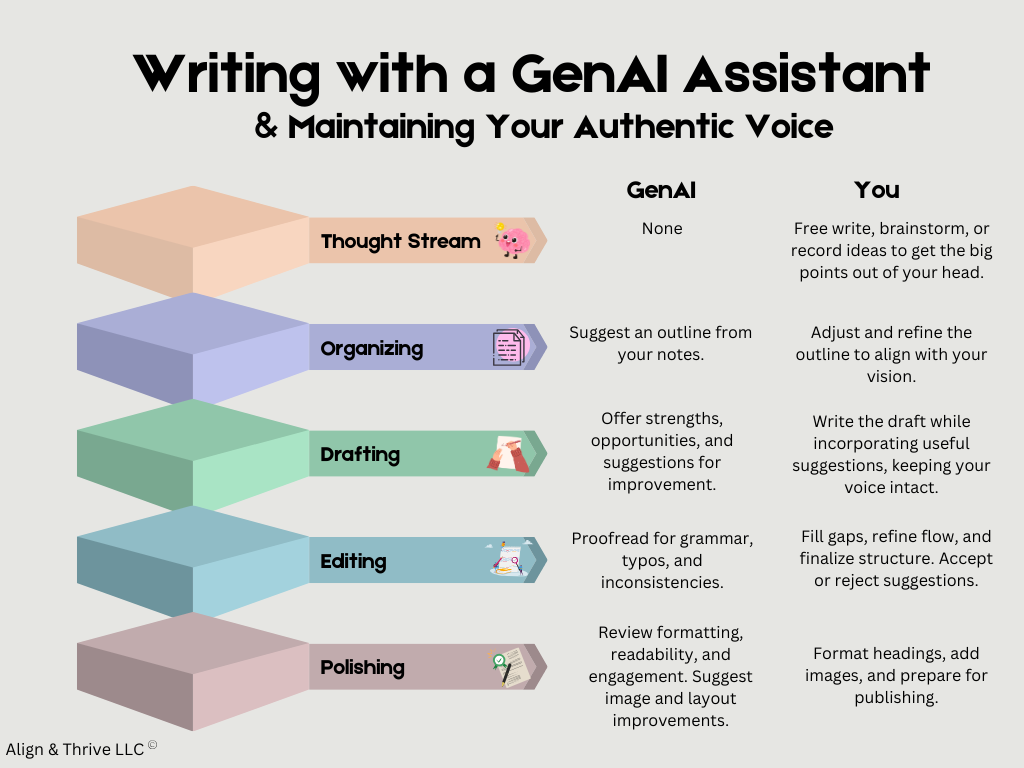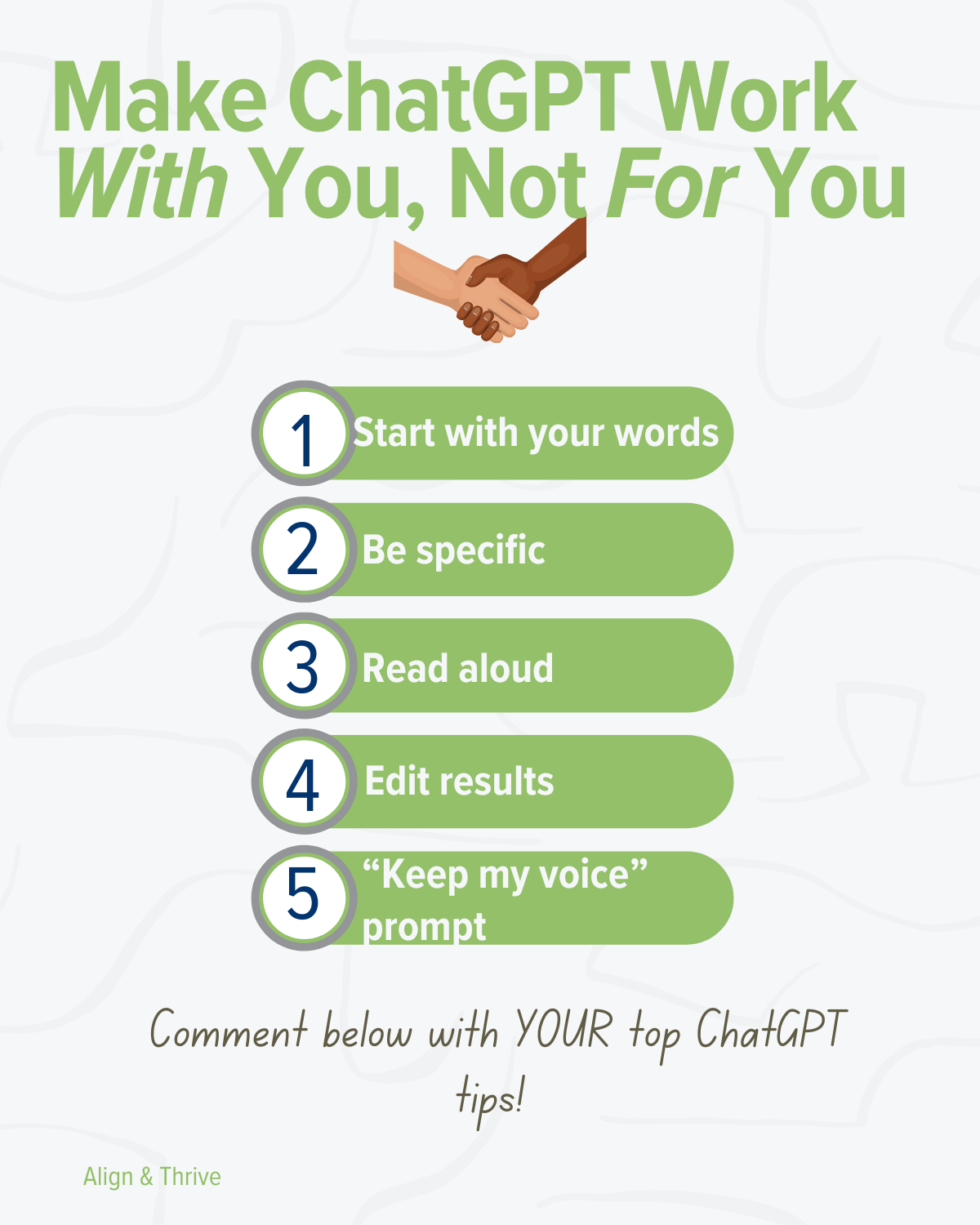Writing with AI: How to Align Your Voice and Thrive with ChatGPT
Writing has always helped me feel aligned and thriving, but it hasn’t always been easy. If you’ve ever struggled with finding your voice, feeling stuck or keeping your writing engaging, you’re not alone. Read on to learn my strategies to overcome the struggle. Subscribe to join the Align & Thrive journey with me!
One activity that has always made me feel aligned and thriving is writing. Only, I’m not great at it. Specifically, I tend to be dry, go on and on, and can’t edit my work to save my life. However, writing has always given me an outlet to think, process, and share. Somehow, I was good enough to be published twice. Not surprisingly, my royalties in 2024 were $68.
But things are different today. I’m different today.
I used to write with the perspective of being the expert in all things. I now have much more humility and curiosity. While I love sharing my experience, strength, and hope with others in hopes there is a nugget that is helpful to you, I’m more focused on you, my audience, than myself. I’m equally open to learning from you. I’m also much more open to review and feedback in all the work that I do. This all allows me to better align my writing with my purpose and passion, to connect with the audience.
Introduction of Generative AI and ChatGPT
Have you ever struggled with feeling like your writing lacks personality? Or wondered how to use tools like ChatGPT without losing your voice?
One of the biggest shifts in writing accessibility has been the introduction of GenAI. For me, that’s my buddy, ChatGPT. This is a double-edged sword, as my buddy tends to be very supportive and excited about everything I do. Sometimes he’s too eager to inject his own voice into writing (like his suggestion for this line, which I’ve chosen to ignore 😊). On rare occasions, this may be good (e.g., helping craft feedback in a supportive tone) but more often this is a disservice to you and the reader. Using GenAI as a writing assistant has helped me reignite my passion for writing and thrive in the process.
I recently shared my Five Rules for using ChatGPT without Sounding Like AI on LinkedIn.
I’m off to a good start – but I’m ready to take it to the next level!
Taking it to the Next Level
I recently attended a webinar through the New York Public Library’s Thomas Yoseloff Business Center, Just Write: How Writing Enhances Your Reputation. Erica Holthausen's approach resonated with me because it reinforced an important truth: AI should enhance, not replace, your unique voice.
As I reflected on her insights, I saw an opportunity to refine my own approach—building on my Five Rules and shaping them into a more structured framework. This expanded process helps writers fully align their creativity with AI’s capabilities while staying true to their voice.
This framework treats AI as a writing assistant, not a content generator—leveraging its strengths in summarization, analysis, and brainstorming while ensuring you remain in control. But just like working with an assistant or trusted peer, AI-generated suggestions should be evaluated, not blindly accepted.
When you ask a co-worker, "How does this sound?" and they offer feedback, it’s up to you to decide what improves your message while keeping your voice intact. The same applies to AI tools like ChatGPT—they should support, not substitute, your creative process.
Before I get into the framework, here are just a few prompts I commonly use when writing for assistance from ChatGPT—whether I’m brainstorming, refining, or polishing my work.
But prompts are just one piece of the puzzle. To truly align my writing with my voice while leveraging GenAI, I use a structured approach that goes beyond just generating ideas. That’s where the framework comes in. It helps me organize, draft, edit, and refine my work while ensuring AI enhances my writing—without taking over my voice.
By treating ChatGPT as a conversation partner rather than a content generator, I stay in control of my message while overcoming technical writing challenges.
I’m sharing this framework with you in hopes that it supports your writing journey as well. As you explore and apply it, I’d love to hear your thoughts and experiences. Let me know how it works for you and what adjustments you make to fit your own style.
Writing with a GenAI Assistant at a Glance

In Conclusion
With the better understanding of my writing strengths and challenges, partnered with ChatGPT as my trusted assistance, I now have more confidence that what I am putting out there will be helpful and engaging for the reader. With this process, you’ll not only feel more aligned with your unique voice but also thrive as a writer who can confidently create content that resonates with your audience.
Have you tried using AI in your writing process? What’s worked well, and where have you struggled? Share your insights in the comments! I’d love to hear how you adapt this framework to your own style, and I may even feature your experiences in Writing with a GenAI Assistant version 2.0!
💛 Enjoyed this post? Let me know by tapping the 💜 (heart) button—it helps more than you know!
☕ Feeling generous? You can support my work (or fuel my caffeine addiction) on Buy Me a Coffee. Every bit means the world!
More options to show the love.






https://hbr.org/2024/07/the-uneven-distribution-of-ais-environmental-impacts
Excellent article!
I would add that, as a heavy GenAI user, my brainstorming sessions really benefit from AI suggestions. You shouldn't just go with whatever the AI suggests though, as that would lead to the same type of content every time.